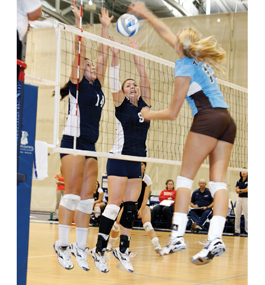In the Game
Play It Forward

Photo by Mike Lovett
Becca Fischer, center, blocks a Tufts spiker in a Brandeis home game.
by ADAM LEVIN ’94
One day while she was teaching elementary schoolchildren in Durban, South Africa, a soccer ball bounced near Becca Fischer ’13, a star middle blocker on the Judges’ volleyball team. To the kids’ astonishment, instead of kicking the ball, she picked it up and did some basic passing with the youngsters.
“The kids were used to seeing a soccer ball kicked, not passed with your hands,” she recalls. More and more students stopped to watch, and suddenly Fischer was doing more than just playing around. “I was able to teach them something completely new,” she says. In South Africa, where soccer, rugby and netball are the holy trinity of sports, Fischer was never even able to find a volleyball to buy.
The San Antonio, Texas, native started playing volleyball as a freshman at her high school — which was in the largest division in Texas and made it to the playoffs every season. So it’s no surprise that Brandeis volleyball coach Michelle Kim was interested in recruiting Fischer, whose initial visit to the campus began as just “an excuse to visit Boston” and concluded with a decision to continue her athletic career with the Judges.
In Fischer, Kim saw a six-foot presence who could step in immediately and hold the team’s defense at the net. She started as the team’s number-two middle blocker in her rookie season, ascending to the top spot in 2011 as a junior. For her part, while Fischer has been a key cog in the Judges’ lineup for three years, she also has looked for ways to be active at Brandeis beyond the court.
An international and global studies major, Fischer studied abroad last summer. She spent six weeks in South Africa, living with a family in Cato Manor, a poor, largely black district in Durban that once had been a shack town. “I knew I wanted to work in Africa, and this was a perfect opportunity,” says Fischer.
Though the family she lived with spoke Zulu as their primary language, her host brother and sisters — ages 8, 10 and 19 — also spoke perfect English and were able to facilitate communication with her host parents and other adults. After a week of attending lectures about South African culture and the Zulu language, Fischer was assigned to one of the poorest, lowest-ranked public schools in the country, where, she says, kids faced indifference, neglect or worse from teachers. The school was crowded and lacked a library, any sort of technology, even basic textbooks.
“I was assigned to a class of 46 first-graders,” Fischer remembers. “On my third day there, the teacher didn’t show up until 11:30, and, when she did, she just watched the kids doing nothing. I stepped in and taught them numbers, and I read to them from a picture book and tried to get them to interact with it, asking questions about what they saw in the pictures.”
Fischer also called on her athletic training frequently while in South Africa. Being able to react to new and different situations and communicate efficiently, she says, were the most important skills that she learned on the court and brought to bear on the teaching environment in Durban. “Working with kids who didn’t speak much English, I had to change my style, depending on the situation,” she explains. “But you have to do that on the court, too, to get everyone on the same page.”
Perhaps most importantly, Fischer’s experience helped her recalibrate her career plans. While she once wanted to become an elementary schoolteacher, the South African experience convinced her to pursue international education reform. “To me, it’s all about working for a greater cause. With volleyball, you do your part on the court to help your team win,” Fischer says. “With education reform, you might be helping one student, or one school or one district, but it’s always about working to achieve a much larger goal: fixing something that has been broken for a long time.”
Adam Levin is sports information director at Brandeis.
